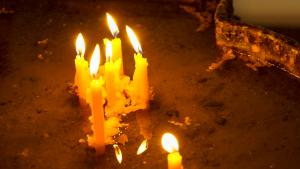 Recovering Authentic Prayer
Recovering Authentic Prayer
In the West, there was a time when most people (not just Christ-followers) knew “the Lord’s Prayer.” In the early 1970s, even in Canada’s public schools, I recall praying it daily at the beginning of the day, followed by singing our national anthem. Unlike our American neighbors, we didn’t say an oath of allegiance, but sometimes we would sing “God, Save the Queen” to remind ourselves that we belonged to the British Commonwealth (a cool word if you think about it and if it had reflected reality).
My impression is that today, very few people on the street could cite the Lord’s Prayer, including most weekly regular church-goers, unless they’re part of a high church tradition that prays it every Sunday.
When my own prayer life fell into shambles and I no longer knew how to pray, I had to fast from praying for many months, with the exception of the “Jesus Prayer,” which is simply, “Lord Jesus Christ, Son of God, have mercy on me a sinner.” I explain that in some detail in A More Christlike Way, including how I understand the word “sinner,” not as my identity but as my daily existential struggle. Unless you’ve completely arrived, don’t balk too quickly. It’s just not a trigger word for me anymore.
Eventually, maybe after six months, I felt I could introduce the Lord’s Prayer into my me-times without presumption. After all, Jesus literally said, “When you pray, pray this.” And so I did, though with some fear and trembling at the boldness I now saw in that prayer, given my wariness about ever telling God what to do again!
I also came to rely heavily on “the prayers of the people” at the monastery where I attended services. When I could not pray, I let their prayers carry me, as on a stretcher, and surrendered to their liturgies as if they were dropping my broken soul through a dismantled ceiling into the care of Christ, my Great Physician.
Gradually, I was able to sing and chant with them through their litanies, praying “Lord, have mercy” for myself and for others in need of Abba’s goodness. In A More Christlike Way, I describe this as standing beneath a waterfall of God’s ever-flowing mercy, never begging for a mercy that God is reluctant to give but rather, opening my heart to the infinite springs of Living Water.
Even before I recovered my own mumbling voice in spontaneous prayer, I learned other prayers of the ancient church, carefully crafted for the needs of my soul. I could pour my heart into these prayers as they provided words and language and emotions I was unable to express alone. These prayers were powerful and beautiful and challenging. I would never have dared prayed some of them except in the name of those saints who composed them. Prayers of David from the Psalms, including joyful prayers, angry prayers and laments of sorrow that mirrored mine. I prayed the words of Mary’s “Magnificat” and Jesus’ “Beatitudes.” I learned the prayers of St. Francis of Assisi and St. Ephraim the Syrian and St. Basil the Great. I began to pray the Nicene Creed almost daily. I kept praying the “Jesus Prayer” but added the “Serenity Prayer” of the recovery community.
I learned what David meant about praying day and night, drenching his pillow with tears or crying out with heart and flesh during panic attacks. I confess that to insist that my third-party, pre-existing prayers were not about learning pretentious religiosity or mindless cadence. I found myself recovering a prayer life that was authentic–real and raw, with words to go with my groans. For me, these prayers became companions in the desert, dripping cool water on my parched tongue.
Eventually, I hope to give some commentary in future posts on these prayers were medicine for my heart. I offer them as a mindfulness option for progressives swirling in the chaos of our stormy world, conservatives dehydrating in the dry wilderness of moralistic religion, and to anyone overwhelmed by the spiritual upheaval of deconstruction. The truth is that life itself is a slippery slope but that’s not an issue if you can anchor into something or Someone you can trust. These prayers anchored me to Christ when I was dangling helpless over the abyss.
Trisagion Prayer
Among my discoveries was the “Trisagion Prayer” of the Orthodox Church. You can guess that the “TRI” in “trisagion” indicates threeness. And you’ll also see that in culminates in their version of “Lord’s Prayer.” At some point, I decided to memorize this prayer and find myself praying it at the end of the day when my head finally hits the pillow … or when I wake up in the night, tossing and turning from whatever troubles me when I’m half awake. I want to just embed a few words of commentary throughout that may be of service.
In the name of the Father and of the Son and of the Holy Spirit,
have mercy on us. Amen.
Glory to thee O Christ, glory to thee.
I love these three lines:
O heavenly King, O Comforter, O Spirit of truth,
who is in all places and fills all things,
Treasury of good gifts and Giver of life,
Note how they especially focus on God as Spirit, our divine Comforter and what a beautiful phrase: “Treasury of good gifts and Giver of Life.” When I pray these words, I bury myself in the arms of Love’s embrace, I open my spiritual hands to heaven’s gifts and I receive an infusion of divine life. With the intention of surrendering to receive, maybe sometimes I actually do.
I also love the unapologetically panentheistic theology. Where is God? Everywhere. More! IN ALL things! And that includes IN ALL people. This is the vision of the ancient church in the Greek/Aramaic East. Although not everyone identifies with the Jesus story, God’s Spirit pervades every cell of every living thing, giving it life, and her divine Love radiates across all worlds and dimensions down to the theoretical strings energizing subatomic particles with the sound of the Word.
Come and abide in us,
cleanse us from every stain,
and save our souls, O Good One.
Having recognized that the Spirit of Love is everywhere and in everyone, we nevertheless pray “come and abide with us.” This not a contradictory statement of God’s absence as you find in some forms of charismatic revivalism … as if God were not here but we need to compel the Presence through formulaic incantations or passionate pleading. No. That would be Baal.
Rather, our invitation is a simple acknowledgment that the eternal nature of God’s ever-present Spirit is LOVE, which is to say, the perichoretic union of mutual consent and participation. The Holy Spirit has sometimes been referred to as “a gentleman.” Not my favorite metaphor. But I suspect it was at least a Victorian effort to name the reality of Love’s consent. More literally, it is really about our willing [re]orientation to the Spirit whose mercy never leaves us.
The problem with honoring the Spirit’s consent by reciprocating with our own is that She may just take us up on it. The request to be cleansed of every stain refers to the ways, as Christ’s Bride, we’ve personally and collectively soiled our wedding gown by fornicating with worldly passions. The Scriptures are graphic when they paint idolatry as adultery, metaphorically. A close reading of spiritual adultery in Ezekiel and Hosea proves R-rated.
So in those brief windows of time when I’ve got the guts to prayer with sincerity, “Cleanse me from every stain and save my soul, O Good One,” I need the reminder that I’m submitting to a God who is “good and merciful and lovest (hu)mankind.” Why? Because now I’m in for a deeper transformation than merely receiving the forgiveness that’s already mine. I’m literally inviting an intervention into my dysfunctions and addictions. And what if God says, “Okay. Are you sure?” I rarely am … and when I am, I need to be ready to loosen my grip and let go. God will come as Judge, not the retributive sort who bangs a gavel and renders punitive verdicts, but the deliverer type that you see in the Book of Judges, saving me from myself to the degree that I’m willing. Thank God that the disposition of the Spirit’s consuming fire is lovingkindness and relentless mercy. The flames of divine MERCY run hot, but always only to fry in me what is not Love’s kind. Phew.
Speaking of mercy, here’s the “trisagion” bit, three identical lines of three identical phrases:
Holy God, Holy Mighty, Holy Immortal, have mercy on us.
Holy God, Holy Mighty, Holy Immortal, have mercy on us.
Holy God, Holy Mighty, Holy Immortal, have mercy on us.
We pray this to acknowledge that for Christians, the one God (God, the All-Merciful) is triune, as the next lines affirm explicitly. But we are not tritheists. We do not believe in three gods. There is only one Holy God, Holy Mighty, Holy Immortal and three hypostases who share that one divine identity (nature, essence, life).
Glory to the Father, Son and Holy Spirit,
Now and ever and unto the ages of ages. Amen.
Now we get to the heart of what I want to consider:
All-holy Trinity have mercy on us.
O Lord, wash away our sins,
Master, pardon our iniquities,
Holy God, heal our infirmities for thy namesake. Amen.
A good many Christians who’ve experienced God’s grace and understand forgiveness have become puzzled about why we would ask for forgiveness when Christ already did so on the Cross. I’m having this conversation enough to warrant a few comments.
First, yes, Christ’s cruciform request, “Father, forgive them,” secured forgiveness for everyone, everywhere and everywhen for all sins, intentional and unintentional, sins of commission and sins of omission. The truth of our being is that we (all of us) were forgiven and reconciled on that day by our Abba through that one act of that one divine Man. Ontologically, “It is finished!”
But existentially, the truth of our being becomes the way of our being as we orient ourselves toward the Cross and receive into our real-life experience the medicinal powers of Christ’s blood (i.e. his sacrificial mercy). The trisagion prayer lays this out in a three-fold healing process. In my mind and heart, I bring my existential crises, our common human condition, under the great faucet of Christ’s mercy and there, I pray:
a. Lord, wash away our sins: That is, cleanse me of the shame I currently feel with the good news that I’m already forgiven. The shame is the stain that I experience when I stumble and from that shame, I create all sorts of toxic stories about God (that he’s angry) and about myself (I’m a piece of shit). I welcome God’s Spirit to wash that away.
b. Master, pardon our iniquities: When I harm someone through my words or actions (or inactions), I am also objectively guilty. That guilt was removed at the Cross, but again, I need to feel its weight lifted from my shoulders and my conscience needs to hear the words of absolution from Christ, lest I slink around, shoulders rounded by a guilt that’s already been resolved.
c. Holy God, heal our infirmities: Anyone who lives in the delusion of alienation knows that their unresolved issues of guilt and shame have an impact on health (mental, emotional and physical). So we ask God to heal us of the ways a life of sin brings about disease of soul and body. We ask God to break the chains of our addictions and attachments and restore us to health and sanity.
Yes, all of this was secured on the Cross, but it is also appropriated in prayer through willing surrender to the care of our loving God.
Lord, have mercy, Lord, have mercy, Lord have mercy.
Glory to the Father, Son and Holy Spirit,
Now and ever and unto the ages of ages. Amen.
Our Father, who art in the heavens, hallowed be thy name.
Thy kingdom come on earth as it is in the heavens.
Give us this day our daily bread
and forgive us our debts, as we forgive our debtors.
And lead us not into temptation but deliver us from the evil one.
For Thine is the Kingdom and the power and the glory,
of the Father and of the Son and of the Holy Spirit,
now and forever and to the ages of ages. Amen.
The following is a slightly different translation of the trisagion prayer as I might chant it in my heart or with my mouth. If you should never take it up yourself, maybe this one time you could hear the reader praying it for you.












